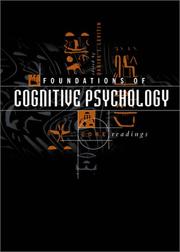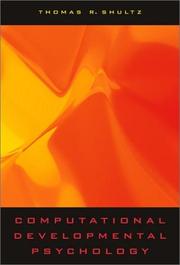| Listing 1 - 10 of 358 | << page >> |
Sort by
|
Periodical
Abstract | Keywords | Export | Availability | Bookmark
 Loading...
Loading...Choose an application
- Reference Manager
- EndNote
- RefWorks (Direct export to RefWorks)
education --- educational psychology --- cognitive psychology --- cognitive sciences

ISBN: 0262122472 0262621592 9786612099823 1282099825 026227826X 0585446539 9780262278263 9780585446530 9780262122474 9780262621595 Year: 2002 Publisher: Cambridge, Mass. : MIT Press,
Abstract | Keywords | Export | Availability | Bookmark
 Loading...
Loading...Choose an application
- Reference Manager
- EndNote
- RefWorks (Direct export to RefWorks)
Scientists from many disciplines, including physics, chemistry, biology, and neuroscience, contribute to the study of cognition. Cognitive psychology, the science of the human mind and of how people process information, is at the core of empirical investigations into the nature of mind and thought. This anthology is based on the assumption that cognitive psychology is at heart empirical philosophy. Many of the core questions about thought, language, perception, memory, and knowledge of other people's minds were for centuries the domain of philosophy. The book begins with the philosophical foundations of inquiry into the nature of mind and thought, in particular the writings of Descartes, and then covers the principal topics of cognitive psychology including memory, attention, and decision making. The book organizes a daunting amount of information, underlining the essentials, while also introducing readers to the ambiguities and controversies of research. It is arranged thematically and includes many topics not typically taught in cognition courses, including human factors and ergonomics, evolutionary psychology, music cognition, and experimental design. The contributors include Daniel Dennett, Daniel Kahneman, Jay McClelland, Donald Norman, Michael Posner, Stephen Palmer, Eleanor Rosch, John Searle, Roger Shepard, and Anne Treisman.
Periodical
Abstract | Keywords | Export | Availability | Bookmark
 Loading...
Loading...Choose an application
- Reference Manager
- EndNote
- RefWorks (Direct export to RefWorks)
psychiatry --- health --- psychology --- cognitive sciences --- social sciences --- medicine

ISBN: 0262195224 0262693518 0262283735 1423726642 9780262283731 9781423726647 9780262693516 9780262195225 Year: 2005
Abstract | Keywords | Export | Availability | Bookmark
 Loading...
Loading...Choose an application
- Reference Manager
- EndNote
- RefWorks (Direct export to RefWorks)
In Panpsychism in the West, the first comprehensive study of the subject, David Skrbina argues for the importance of panpsychism--the theory that mind exists, in some form, in all living and nonliving things--in consideration of the nature of consciousness and mind. Despite the recent advances in our knowledge of the brain and the increasing intricacy and sophistication of philosophical discussion, the nature of mind remains an enigma. Panpsychism, with its conception of mind as a general phenomenon of nature, uniquely links being and mind. More than a theory of mind, it is a meta-theory--a statement about theories of mind rather than a theory in itself. Panpsychism can parallel almost every current theory of mind; it simply holds that, no matter how one conceives of mind, such mind applies to all things. In addition, panpsychism is one of the most ancient and enduring concepts of philosophy, beginning with its pre-historical forms, animism and polytheism. Its adherents in the West have included important thinkers from the very beginning of Greek philosophy through the sixteenth and seventeenth centuries to the present.Skrbina argues that panpsychism is long overdue for detailed treatment, and with this book he proposes to add impetus to the discussion of panpsychism in serious philosophical inquiries. After a brief discussion of general issues surrounding philosophy of mind, he traces the panpsychist views of specific philosophers, from the ancient Greeks and early Renaissance naturalist philosophers through the likes of William James, Josiah Royce, and Charles Sanders Peirce--always with a strong emphasis on the original texts. In his concluding chapter, "A Panpsychist World View," Skrbina assesses panpsychist arguments and puts them in a larger context. By demonstrating that there is panpsychist thinking in many major philosophers, Skrbina offers a radical challenge to the modern worldview, based as it is on a mechanistic cosmos of dead, insensate matter. Panpsychism in the West will be the standard work on this topic for years to come.
Philosophical anthropology --- Esoteric sciences --- Panpsychism --- History. --- History --- Animism --- Consciousness --- Philosophy --- Hylozoism --- COGNITIVE SCIENCES/General --- COGNITIVE SCIENCES/Psychology/Cognitive Psychology
Book
ISBN: 0262016826 0262300621 0262303728 9780262303729 9780262016827 Year: 2011 Publisher: Cambridge, Mass. : MIT Press,
Abstract | Keywords | Export | Availability | Bookmark
 Loading...
Loading...Choose an application
- Reference Manager
- EndNote
- RefWorks (Direct export to RefWorks)
Academic interest in the phenomenon of joint attention -- the capacity to attend to an object together with another creature -- has increased rapidly over the past two decades. Yet it isn't easy to spell out in detail what joint attention is, how it ought to be characterized, and what exactly its significance consists in. The writers for this volume address these and related questions by drawing on a variety of disciplines, including developmental and comparative psychology, philosophy of mind, and social neuroscience. The volume organizes their contributions along three main themes: definitional concerns, such as the question of whether or not joint attention should be understood as an irreducibly basic state of mind; processes and mechanisms obtaining on both the neural and behavioral levels; and the functional significance of joint attention, in particular the role it plays in comprehending spatial perspectives and understanding other minds. The collected papers present new work by leading researchers on one of the key issues in social cognition. They demonstrate that an adequate theory of joint attention is indispensable for a comprehensive account of mind.

ISBN: 0262025140 0262523221 0262268027 0585436878 9780262025140 9780262523226 Year: 2002 Publisher: Cambridge, Mass. : MIT Press,
Abstract | Keywords | Export | Availability | Bookmark
 Loading...
Loading...Choose an application
- Reference Manager
- EndNote
- RefWorks (Direct export to RefWorks)
The fifty-seven original essays in this book provide a comprehensive overview of the interdisciplinary field of animal cognition. The contributors include cognitive ethologists, behavioral ecologists, experimental and developmental psychologists, behaviorists, philosophers, neuroscientists, computer scientists and modelers, field biologists, and others. The diversity of approaches is both philosophical and methodological, with contributors demonstrating various degrees of acceptance or disdain for such terms as "consciousness" and varying degrees of concern for laboratory experimentation versus naturalistic research. In addition to primates, particularly the nonhuman great apes, the animals discussed include antelopes, bees, dogs, dolphins, earthworms, fish, hyenas, parrots, prairie dogs, rats, ravens, sea lions, snakes, spiders, and squirrels. The topics include (but are not limited to) definitions of cognition, the role of anecdotes in the study of animal cognition, anthropomorphism, attention, perception, learning, memory, thinking, consciousness, intentionality, communication, planning, play, aggression, dominance, predation, recognition, assessment of self and others, social knowledge, empathy, conflict resolution, reproduction, parent-young interactions and caregiving, ecology, evolution, kin selection, and neuroethology.

ISBN: 9780262194839 026219483X 0262303035 9780262303033 0262529157 Year: 2003 Publisher: Cambridge, Mass. : MIT Press,
Abstract | Keywords | Export | Availability | Bookmark
 Loading...
Loading...Choose an application
- Reference Manager
- EndNote
- RefWorks (Direct export to RefWorks)
An overview of the emerging discipline of computational developmental psychology, emphasizing the use of constructivist neural networks.Despite decades of scientific research, the core issues of child development remain too complex to be explained by traditional verbal theories. These issues include structure and transition, representation and processing, innate and experiential determinants of development, stages of development, the purpose and end of development, and the relation between knowledge and learning. In this book Thomas Shultz shows how computational modeling can be used to capture these complex phenomena, and in so doing he lays the foundation for a new subfield of developmental psychology, computational developmental psychology.A principal approach in developmental thinking is the constructivist one. Constructivism is the Piagetian view that the child builds new cognitive structures by using current mental structures to understand new events. In this book Shultz features constructivist models employing networks that grow as well as learn. This allows models to implement synaptogenesis and neurogenesis in a way that allows qualitative changes in processing mechanisms. The book's appendices provide additional background on the mathematical concepts used, and a companion Web site contains easy-to-use computational packages.
Cognitive psychology --- Developmental psychology --- Developmental psychology. --- Cognitive science. --- Science --- Philosophy of mind --- Development (Psychology) --- Developmental psychobiology --- Psychology --- Life cycle, Human --- COGNITIVE SCIENCES/General --- COGNITIVE SCIENCES/Psychology/Cognitive Psychology
Book
ISBN: 0262320673 0262028107 1322519668 9780262320672 9780262028103 0262321157 9780262321150 0262320681 0262027569 1322094705 0262321165 0262528835 Year: 2014 Publisher: Cambridge, Massachusetts ; London, England : The MIT Press,
Abstract | Keywords | Export | Availability | Bookmark
 Loading...
Loading...Choose an application
- Reference Manager
- EndNote
- RefWorks (Direct export to RefWorks)
"The computer analogy of the mind has been as widely adopted in contemporary cognitive neuroscience as was the analogy of the brain as a collection of organs in phrenology. Just as the phrenologist would insist that each organ must have its particular function, so contemporary cognitive neuroscience is committed to the notion that each brain region must have its fundamental computation. In After Phrenology, Michael Anderson argues that to achieve a fully post-phrenological science of the brain, we need to reassess this commitment and devise an alternate, neuroscientifically grounded taxonomy of mental function. Anderson contends that the cognitive roles played by each region of the brain are highly various, reflecting different neural partnerships established under different circumstances. He proposes quantifying the functional properties of neural assemblies in terms of their dispositional tendencies rather than their computational or information-processing operations. Exploring larger-scale issues, and drawing on evidence from embodied cognition, Anderson develops a picture of thinking rooted in the exploitation and extension of our early-evolving capacity for iterated interaction with the world. He argues that the multidimensional approach to the brain he describes offers a much better fit for these findings, and a more promising road toward a unified science of minded organisms"--MIT CogNet.
Brain --- Physiology. --- COGNITIVE SCIENCES/General --- COGNITIVE SCIENCES/Psychology/Cognitive Psychology --- NEUROSCIENCE/General --- Neuropsychology --- Methods --- Cognition --- Cognitive psychology --- Physiology of nerves and sense organs --- Physiology

ISBN: 026220164X 0262701243 9786612098468 0262284847 1282098462 1429410027 9780262201643 0262303469 9780262284844 9781282098466 9780262701242 9781429410021 6612098465 9780262303460 Year: 2006 Publisher: Cambridge, Mass. MIT Press
Abstract | Keywords | Export | Availability | Bookmark
 Loading...
Loading...Choose an application
- Reference Manager
- EndNote
- RefWorks (Direct export to RefWorks)
"In Hot Thought, Paul Thagard describes the mental mechanisms - cognitive, neural, molecular, and social - that interact to produce different kinds of human thinking, from everyday decision making to legal reasoning, scientific discovery, and religious belief, and he discusses when and how thinking and reasoning should be emotional." "Thagard argues that an understanding of emotional thinking needs to integrate the cognitive, neural, molecular, and social levels. Many of the chapters employ computational models of various levels of thinking, including HOTCO (hot cognition) models and the more neurologically realistic GAGE model. Thagard uses these models to illuminate thinking in the domains of law, science, and religion, discussing such topics as the role of doubt and reasonable doubt in legal and other contexts, valuable emotional habits for successful scientists, and the emotional content of religious beliefs. Identifying and assessing the impact of emotion, Thagard argues, can suggest ways to improve the process of reasoning."--Jacket.
Book
ISBN: 0262034085 0262335123 0262335115 9780262335119 9780262335102 0262335107 9780262335126 9780262034081 Year: 2016 Publisher: Cambridge, Massachusetts : The MIT Press,
Abstract | Keywords | Export | Availability | Bookmark
 Loading...
Loading...Choose an application
- Reference Manager
- EndNote
- RefWorks (Direct export to RefWorks)
"This volume contributes to a current debate within the psychology of thought that has wide implications for our ideas about creativity, decision making, and economic behavior. The essays focus on the role of implicit, unconscious thinking in creativity and problem solving, the interaction of intuition and analytic thinking, and the relationship between communicative heuristics and thought. The analyses move beyond the conventional conception of mind informed by extra-psychological theoretical models toward a genuinely psychological conception of rationality--a rationality no longer limited to conscious, explicit thought, but able to exploit the intentional implicit level. The contributors consider a new conception of human rationality that must cope with the uncertainty of the real world; the implications of abandoning the normative model of classic logic and adopting a probabilistic approach instead; the argumentative and linguistic aspects of reasoning; and the role of implicit thought in reasoning, creativity, and its neurological base"--MIT CogNet.
Cognitive psychology --- Reasoning (Psychology) --- Cognition. --- Subconsciousness. --- COGNITIVE SCIENCES/General --- COGNITIVE SCIENCES/Psychology/Cognitive Psychology --- Unconscious (Psychology) --- Unconsciousness --- Psychology --- Thought and thinking
| Listing 1 - 10 of 358 | << page >> |
Sort by
|

 Search
Search Feedback
Feedback About
About Help
Help News
News